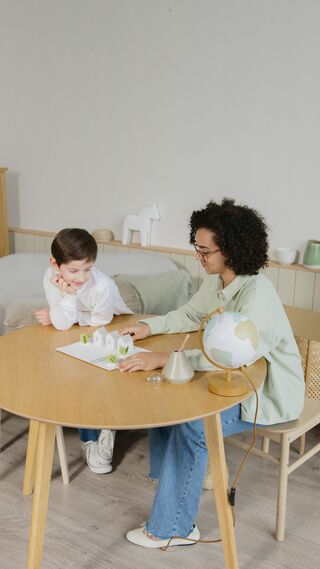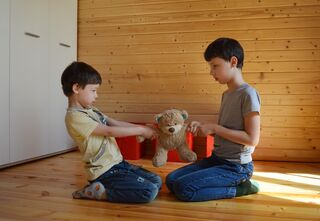Relationships
The Best Way to Help Kids Through Challenges
Talking through emotions in nuanced ways helps kids learn coping skills.
Posted July 21, 2022 Reviewed by Jessica Schrader
Key points
- Trying to pry information out of kids often keeps them feeling pressured or as though the adult is trying to “get” something from them.
- Especially when kids are struggling with an emotion, focusing only on that emotion can overwhelm them.
- Instead, start “emotionally reminiscing,” or talking through past experiences in a way that’s full of details and nuanced emotions.

“Although the world is full of suffering, it is also full of the overcoming of it.” –Helen Keller
It can be hard to get kids to open up, especially when they’re feeling shy, or when they have a shameful or embarrassing experience on their minds. We tend to think of asking more questions, especially open-ended ones, or ones with no one right answer—for example, “Why are you sad?” or “What happened today?”
When kids can’t answer, or don’t answer immediately, this can trigger a sense that we are the ones to blame. We can go into question-asking mode, asking more and more questions, not even noticing if kids are shutting down. Or we might just try to ignore their negative moods, hoping that they’ll forget it, or it will pass.
Use Dialogue to Make Meaning of Challenges
But there has been fascinating research conducted on the ways in which back-and-forth talk between parents (as well as caregivers) and children can support children to make meaning of their experiences. It’s not only about processing their experiences, although that’s a part of it. Instead, it’s equally about constructing a sense of themselves as people, located in space and time, in a community, and in history.
Through this kind of talk, they don’t only understand the experiences better. They also are helped to construct meaning from those experiences, and understand what those experiences mean for them. This can be critical in helping a child not learn mostly negative lessons from tough experiences, but instead gain wisdom and coping strategies.
Over 20 years of research have established that these “past memory” conversations, as they’re called, allow kids to learn to step out of themselves and see their experiences in a more compassionate and reflective light. Studies have also found that children of mothers trained in emotional reminiscing described richer, more elaborate memories than those of mothers who weren’t trained. It seems that this kind of reminiscing helps children have the language to describe their experiences.
More recently, a 2021 study found that even first and second grade students could engage in collaborative storytelling online—and that most of their storytelling didn’t have to do with the COVID-19 pandemic. Especially at a time when so many children are facing traumatic and stressful experiences, we can support them in a range of modalities to tell stories in conjunction with others. This can be parents or caregivers—but we can equally support kids to do this kind of storytelling with one another. This creates a community far more open to discussion and debate than we might have had previously.
The Misconception of “Don’t Talk About Negative Events”
In popular culture, we often think about not talking about children’s negative experiences. Isn’t it better just to “sweep it under the rug,” as the popular saying goes? Actually, this silence can backfire, leaving kids to deal with their negative experiences alone. They may make a false meaning from them, or gain a distorted understanding from what they hear.
For example, a child may think that his friend moved away because the friend didn’t like him. Really, the move was simply due to a parent’s job. While the hurt of missing the friend is real, the reasoning is flawed. And this reasoning can stay with a child.
So with all that in mind, how should we help kids open up, especially when facing hard experiences? A recent study, published in 2021 in the Frontiers of Psychology, asked Chinese-American and European-American mothers to discuss an event with their 4.5-year-old children, which the children found emotionally negative. The researchers studied the ways the mothers talked, and then assessed the children’s mental health at 7 years of age.
As the researchers found, in both cultures, mothers who talked more about negative emotions (for example, “sad” or “scared”) tended to have children who showed fewer behavior problems and less evidence of depression and anxiety. As Robyn Fivush at Emory University and others have found, helping children label their emotions and express theories about why difficult experiences occurred supports them in making meaning of hard events.
This is as true, interestingly, of “big” events such as tornadoes and pandemics, and of smaller daily stressors, like losing a toy. In both cases, helping children wade through the complexities of the events and understand their own coping strategies is key. The emotions can feel big, even if the events don’t seem as big or overpowering. That’s why, in part, telling a child “that’s not a big deal” doesn’t much help them. It feels like a big deal—and we can address those big feelings, even if we know that the problem itself isn’t life-altering.

So what does helping kids through challenges sound like?
Emotional reminiscing tends to involve a few main components:
- Talking about feelings, especially negative ones, with feeling words (“sad,” “angry,” “scared”).
- Children and adults talking about their own and others’ emotions (“I was anxious” or “Were you feeling nervous?”). Especially think of elaborating on children's emotions, for example asking, "Were you more anxious, or more shy?" and of confirming what you think of as their emotions, for example asking, "I got the sense you were frustrated. Is that right?"
- Giving explanations for feelings: “You were mad because dad took your toy” or “I was sad because we had to move."
- Using specific details and rich, sensory detail. (Think of describing a movie. “The dentist’s chair was cold, and I was scared.")
- Confirming what happened or how children felt: “I missed my grandma.” “Yes, I know you did.”
Take-home message
These strategies help kids of all ages make sense of their experiences and grow stronger from them. Once you talk through the hard experience, try asking kids: “How did you show your strengths?” or “What might you try the next time?” This helps keep your focus optimistic, even when talking about challenges, and lets kids know they can make it through anything.
References
Alonso-Campuzano C, Iandolo G, Mazzeo MC, Sosa González N, Neoh MJY, Carollo A, Gabrieli G, Esposito G. Children's Online Collaborative Storytelling during 2020 COVID-19 Home Confinement. Eur J Investig Health Psychol Educ. 2021 Dec 10;11(4):1619-1634. doi: 10.3390/ejihpe11040115. PMID: 34940393; PMCID: PMC8700547.
Bird A, Reese E. Emotional reminiscing and the development of an autobiographical self. Dev Psychol. 2006 Jul;42(4):613-26. doi: 10.1037/0012-1649.42.4.613. PMID: 16802895.
Reese E, Newcombe R. Training mothers in elaborative reminiscing enhances children's autobiographical memory and narrative. Child Dev. 2007 Jul-Aug;78(4):1153-70. doi: 10.1111/j.1467-8624.2007.01058.x. PMID: 17650131.


